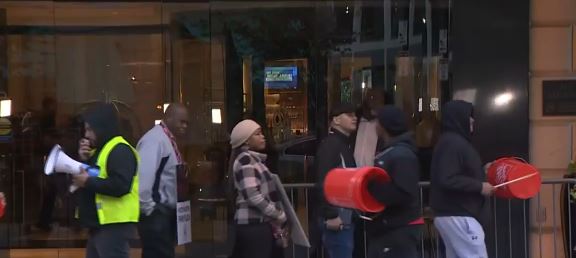In the heart of Boston, a significant labor movement has taken shape, as hundreds of hotel workers from the city’s two largest Hilton properties embark on an open-ended strike. This action, which commenced on a recent Sunday, marks a pivotal moment not only for the workers involved but also for the hospitality industry at large. Unlike previous strikes that were limited in duration, this one signals a deepening resolve among workers who are determined to secure a fair and equitable agreement with their employers.
The striking workers encompass a diverse array of roles critical to the daily operations of the hotels—room attendants, housepersons, front desk agents, and kitchen staff, among others. Their collective action underscores a growing trend in labor movements across the United States, where workers in various sectors are increasingly willing to stand firm in their demands for better wages and working conditions. This strike is particularly noteworthy as it comes on the heels of a series of limited-duration strikes that occurred during Labor Day weekend, which had already raised awareness about the conditions faced by hospitality workers.
With contracts for 36 Boston properties having expired on August 31, the strikers voted overwhelmingly to authorize a citywide strike, demonstrating solidarity and a united front in pursuit of their goals. The picket lines outside the Park Plaza and the Hilton hotel at Logan Airport have become a symbol of this struggle, showcasing the determination of workers to advocate for their rights.
Labor experts emphasize that the current strike reflects broader national trends. According to a report by the Bureau of Labor Statistics, the hospitality sector has seen a marked increase in unionization efforts, driven by workers seeking to address long-standing issues such as low wages and inadequate benefits. “Workers are no longer afraid to voice their concerns and demand change,” notes Dr. Emily Thompson, a labor relations scholar. “This movement is about reclaiming dignity in the workplace.”
The implications of this strike extend beyond the immediate concerns of the workers. The hospitality industry, which has been grappling with staffing shortages and the pressures of a post-pandemic recovery, now faces a critical juncture. As hotels strive to return to pre-pandemic levels of service, the demands of workers for better pay and conditions could lead to a reevaluation of industry standards. If successful, the striking workers could pave the way for similar movements across the country, influencing labor practices in a sector that has often been criticized for its treatment of employees.
For guests and travelers, the strike may cause disruptions, with potential delays in service and adjustments in hotel operations. However, it’s essential to recognize that the actions taken by these workers are not just about immediate personal grievances; they represent a broader call for justice in the workplace. As the strike unfolds, it serves as a reminder of the importance of fair labor practices and the ongoing struggle for workers’ rights in an ever-evolving economic landscape.
As this narrative continues to develop, it will be crucial to monitor the negotiations between the workers and hotel management. The outcome will not only affect those directly involved but could also set a precedent for labor relations in the hospitality industry nationwide. In a time when workers are increasingly asserting their rights, this strike stands as a beacon of resilience, highlighting the ongoing fight for equity and respect in the workplace.

